Interview with Dria Murphy, Founder of PR Firm Alise Collective
Walk me through your career path.
I’m from San Francisco, and I moved to NYC the summer before I graduated college. I interned at Giorgio Armani and Bottega Veneta in the PR and Communications Department. After that, I knew I wanted to move back to the city after college. It’s such a competitive industry, and once you start conversing with HR, they want you to come in for an interview either later that day or the next day. Therefore, I moved to the city without a job.
I began working as a freelancer at Paul Wilmot Communications. I started right before fashion week, and we covered 12 shows that season. I immediately got my foot in the door in terms of learning. I was able to be hands on with the shows, where I worked on the guest list and checkin. I also worked with clients, such as Naeem Kahn, The Limited and Gwen Stefani’s line, L.A.M.B. It was a dynamic range of working with both contemporary and luxury clients. I had a lot on my plate and gained an abundance of knowledge.
Next, I went in-house to work in PR at Calvin Klein. The position, titled PR Assistant for Men’s & Women’s, had just been created. I was pulled in so many different directions, and was learning a great deal from an industry and management perspective. I had two bosses that couldn’t be more opposite in terms of personality, how they worked, and what they needed.
I was there for a year, and moved to Ralph Lauren to work in a PR Coordinator role. Going from an American headquarters to another American headquarters was fabulous, but it’s difficult to be creative and institute new ideas (especially when you’re junior) at longstanding companies. My role was similar to what I was doing at Calvin Klein, and I wanted something new.
A recruiter called me with an opportunity to interview at Topshop. At the time, Topshop had a small corporate presence in the US. I met with the Director of PR, and we immediately clicked. It was a long process in terms of waiting to hear back from the London headquarters, but eventually I became PR Manager at Topshop.
This is where I got into the digital world. It was the first company to offer a shoppable runway with Topshop Unique, and to do a Google Hangout during fashion week. They weren’t scared to experiment with digital. Since the team in the US was so small, we really got to work with and experience everything. While there, a recruiter reached out to me about a company called Keep. I got excited because it was a new platform, and they were looking for someone with a fashion background to work with editors, influencers, etc to promote the product.
It was a blank slate to do what I wanted creatively. They wanted me to help curate the site and work with social, marketing, etc. Working at a startup allowed me to learn more about tech. I could have a conversation with someone and execute it 3 hours later, which wasn’t something I had experienced in the past.
One day, we walked into work, and it was everyone’s last day. I had a full range of partnerships coming up, so it was a surprise. That weekend, I had an event in the Hamptons that I ended up doing for professional good faith. I got my first client from that event, and started consulting for The Surf Lodge. Google Play Music was their biggest sponsor that summer, and they needed someone to handle everything from influencer dinners to projects, etc.
I met Hilary Neve de Mevergnies who is the Head of Brand Communications & Strategic Initiatives at Google. She became such a mentor to me. She was starting a new subdivision at Google, and they became a client. Working with Google and The Surf Lodge helped me realize I needed to do something on my own.
From there, I’ve worked with a variety of lifestyle clients in the fitness, tech and fashion fields. I get to choose who I want to work with, and really believe in them. I become part of their business, especially if it’s a smaller brand.
Tell me about your time as a PR intern at Giorgio Armani & Bottega Veneta.
I always knew I wanted to work in fashion. PR was natural to me, because I loved connecting, working with and meeting new people. I chose to intern at Armani, because it was a proper internship program. Every week, there was a talk for the interns on different divisions.
You really learned the whole company in terms of the various positions and departments. The internship ended, and I had a month left before school started, so I interned at Bottega Veneta. It was invaluable to get to work in-house and be exposed to multiple companies.
What does it mean to work in PR?
The meaning has changed over the years. What I do is create buzz and exposure for brands. It isn’t just placement in magazines or online publications. It’s also, events, influencer strategy, marketing, digital, social media and more. Some people think of PR as one dimensional, but these days, you won’t be too successful if you think that way.
Did you always want to start your own company?
I don’t think I ever had a dream to have my own company. I love being able to set my own schedule and choose who I work with. Life’s too short to be micromanaged or to worry about silly things. The fashion world can be intense, and this way I can still be a part of it, but in my own way.
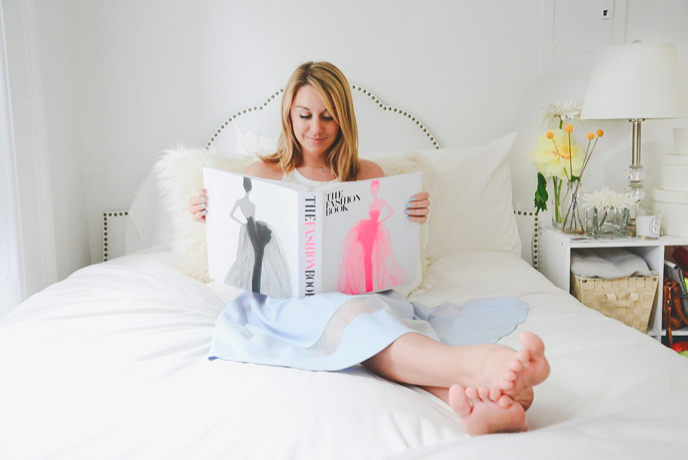
How did you choose the name, Alise Collective?
I was struggling with the name. Alise is my middle name. I wanted it to be personal, but not use my first name. I chose Collective, because I wanted it to be open-ended. I didn’t want PR to be in the name, because it’s more than that.
Tell me about your website.
The website came a year after the business started. It wasn’t my priority to get it together because I was focusing on working with my clients. I had a splash page, so people could email me. I didn’t have that much content to share in the beginning. Once I started getting content, I felt it was doing me an injustice not to have a website.
What does your day-to-day look like?
It varies greatly. Most mornings, I take editors to a workout class at Bari Studio, which is one of my clients. It’s important for them to experience the method and be in the space. I’m always on the go.
I don’t have an office, so I’ll work from Soho House or a coffee shop. I’m constantly on calls, meeting with people and attending events. I ensure my clients know what’s going on in the city and brainstorm different initiatives they could be a part of or how they can access a different audience.
How did you learn to start and grow a business?
I have amazing mentors that I learn from and that give me their perspective. It’s a growing, learning process, which is evolving. The fact that this is my reputation and a reflection of me is my driving force. One of the main factors I’ve held strongly to is only taking on clients I really believe in. It’s hard though, for example, a fashion brand wasn’t my first or second client.
This was interesting since I grew up wanting to work in the fashion industry. I had been talking to a couple of brands that had a large marketing budget, but I wasn’t that excited about them. I asked myself would personally wear this, and if the answer was no, I knew I shouldn’t work with them. I feel strongly that my holding out until the perfect opportunity came along has led to my success.
People know what I stand for, what types of clients I’m working with, and what I’m doing. Alise Collective is my personal brand. If it wasn’t something I would wear, go to or use, I won’t do it. I think that’s led to my success, but it’s difficult because at the end of the day you have to pay the bills.
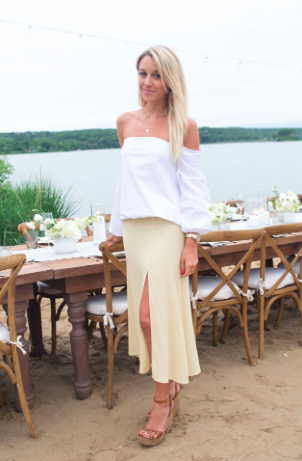
Walk me through the services Alise Collective provides, and how you gained expertise in each area.
All clients are different in terms of what they need and want. I’ve been grateful that my experience has led me to be an expert in different fields, and that I’ve gotten to learn from such great people. The services we provide include:
- PR: where I come up with creative ideas and get the client in the press. If you’d don’t have something new, you need to find a hook (for example, getting the founder’s name out there featuring their home or lifestyle, as well as the brand in a publication)
- Create a brand experience the customer will fully relate to and understand
- Partnerships: getting other brands that have the same style aesthetic is imperative because it’s a new audience, but the right type of audience. Partnerships and events work hand-in-hand
- Social: you need to promote the event/partnership in order for it to be successful. I usually advise on social, but don’t handle it directly solely based on bandwidth. I love doing it on my personal Instagram for fun, but it can be stressful and is a full time job
- Events: this can entail putting on a fashion week party, guest list curation, finding vendors, coming up with concepts of the right food, catering and activation. It depends on the scale. I’ve worked on events with Google where the guest list is 4,000 people, and I’ve also done events with 15 people. What’s really important is having the right venue that is on-brand with the client and having the right people attend. You need to create a space that makes you feel good, and gives a sense of what the brand is about. Doing something at a venue that’s off brand dilutes the whole thing. You want to get press there, but also people that are interested in the product or service. Photos are so important. I work with BFA frequently; what they do is so incredibly important. People love to be photographed, and it’s perfect for post press and event recaps. I love a take home as well. I think doing it the right way where it isn’t so branded can be impactful.
- Influencer strategy: it’s important to bring in the right type of influencer. A lot of my clients don’t have budgets, which is fine, but you need to be scrappy and hustle. It’s important that I have a network of people that are interested in what I’m doing that I can bring to events or will come if I send them an invite. The payment of bloggers has reached a new level. I need to come up with ways my clients can still be involved in this, even though they don’t have the budget
I work with each client based on their needs. It varies from wanting to be featured in the press, up their google searches or be well-known in that area. Some hope to bring a new crowd into the studio or place in order for them to experience the service or platform. It differs, which I like, because it’s more creative. I also love when my clients collabroate.
Female CEOs and founders has become a theme in my clients. Since some of my clients are small, although I’m not internally working with their company, it feels that I am. It’s all-encompassing, which can be overwhelming, but rewarding because you can really see the impact you have. It’s difficult to feel you’re making an difference when you’re working at a large company.
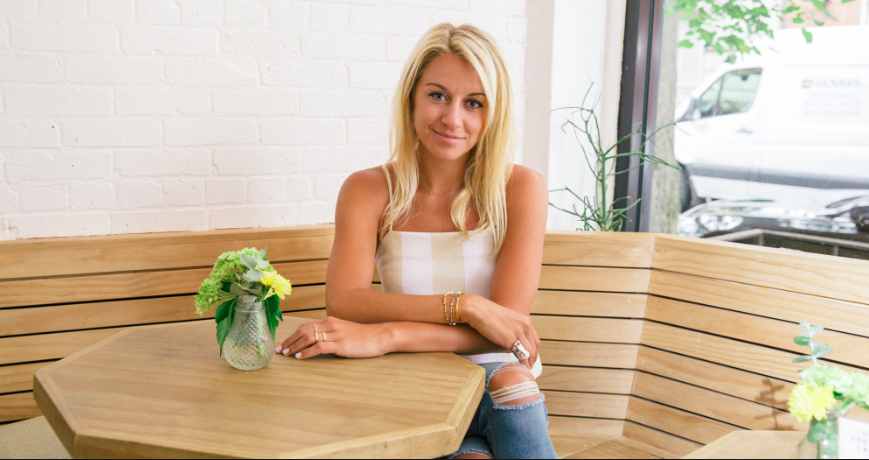
Tell me about the strategy with your personal Instagram.
It was organic in the sense that I love taking pictures, I enjoy creating the perfect atmosphere. I don’t rearrange the table for a photoshoot. I’ll do it quickly, and edit later, which is how I think it should be. I continually tell myself to live in the moment and be present.
Building my Instagram following and style has also helped me with my business because I’ve had clients find me on Instagram. One of my first clients invited me to a workout class because they liked what they saw on my Instagram. I want to keep it to where I enjoy it. I could probably spend more time creating a strategy, but at the end of the day, it’s a side thing I like to do.
What advice would you give someone at the beginning of their career?
Networking is the #1 most important thing. My boss at my internship became my boss at Calvin Klein. At the end of the day, it’s about your relationships. Being nice, helpful and working really hard goes a long way.
People remember that, and you never know when that person will come up in your career again. Create mentors, reach out and be proactive. It’s important for women to help women in this industry, since it’s not always the nicest place to be.
Talk to me about building your network.
It happened in an organic and authentic way. You have to be very sincere. People don’t have that much time. You need to find a common ground and run with that. You can see right through people – you have something they need so that’s why they’re acting that way.
You’ve got to stay true to yourself, and be honestly interested in what the other person is saying and doing. Not so much of a drive by to get your client that placement. It’s about long-term relationships. There are people I work with now that I worked with as an assistant, and we’ve grown together. I constantly meet new people at events, but the follow-up and one-on-one is important.
Making the time, even if it’s just a coffee, to get to know more about their professional and personal life is key. If you can relate to them, you’ll be better at your job and make a new friend. You want to work with people you like and share similar interests with.
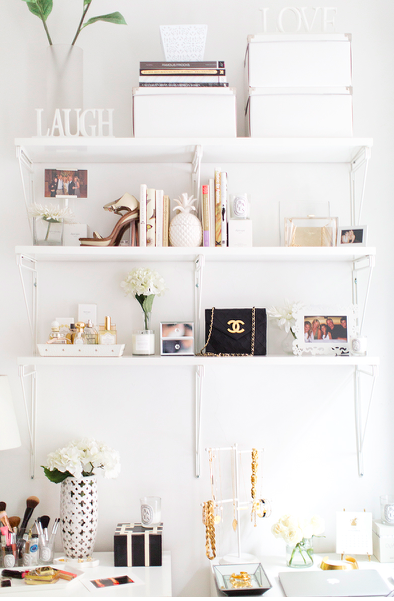
What were the biggest challenges you faced when starting Alise Collective?
Initially, the biggest challenge was accounting. I found an accountant that taught me step-by-step how to LLC yourself, what you can or can’t write off, insurance, etc. Financially figuring out how I was going to do everything was the biggest hurdle. I was lucky that I had some savings, but I knew I needed to hustle and make things work.
How do you set your pricing?
I work with each client to see what they can afford, what makes sense for my time, etc. I love getting to work with smaller brands, but they don’t have large budgets. If I can work out a way that’s a win-win for both, I’m really happy. Having confidence is key since you’re on your own. I had a sense of what I was doing professionally, but it’s scary wondering if I’m going to be able to continue to have clients in order to pay my rent each month.
How do you set your schedule?
It’s really anytime. My google calendar is color coded, and everything is planned. I live by my calendar. It’s imperative to my job and my life. So much of the work and play go together. Some of the people I’ve worked with for years are my friends.
Although you’re talking over brunch about one of your clients and how you’ll work together, it doesn’t seem like work. There’s a balance. It’s hard in this type of work, because you feel like you always have to be on. It can take a lot out of you which you don’t necessarily realize.
What is your escape?
I love working out, and that’s why having a fitness client is so important to me. It’s great working with Bari Studio because they have four different classes. I love going out to dinner and getting drinks in NYC. I also enjoy traveling and seeing new places.
Do you travel for work?
Not a ton because most of my clients are based in NY. If I’m traveling, I’ll schedule work-related meetings.
How has working with fashion during your internship vs. Alise Collective changed?
It’s changed so much. I’m almost not in that day-to-day anymore. I love fashion, but I’m happy to be a little removed. Social media has changed the industry, for example, being able to watch a fashion show from your phone. Another example of how it’s changed is that the print magazines are no longer the main place that brands want to be covered, and instead, it’s online and through bloggers.
Where is your organization today, and where do you see it in the future?
Today, I have a lifestyle company, and I couldn’t be happier. It’s overwhelming at times, because in one day I could be talking to a food editor, a fitness blogger and a CEO. It’s always different, which is what I like about it. In the future, I’ll continue to do what I do, and grow small businesses, but also work with large companies on strategic initiatives that make a large impact.
I love the high to low. I feel grateful to work on a massive project dealing with a launch in the tech world and also being able to see a small fashion brand triple their revenue in a year. I’m hoping to continue to do both, because that’s what really drives me.
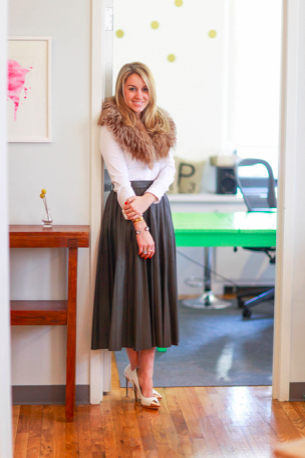
Delia Folk
BY
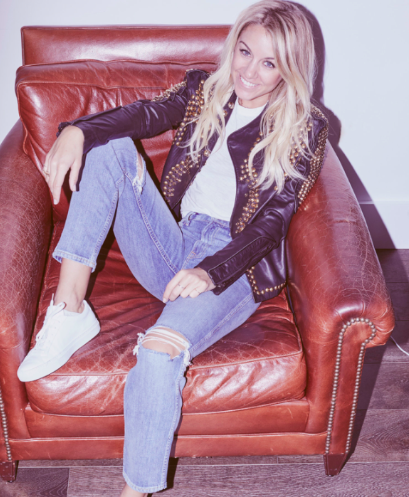
you said: